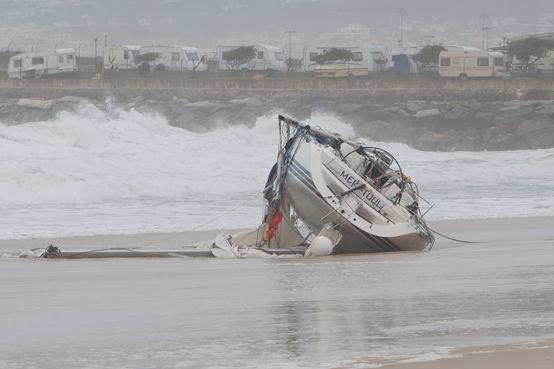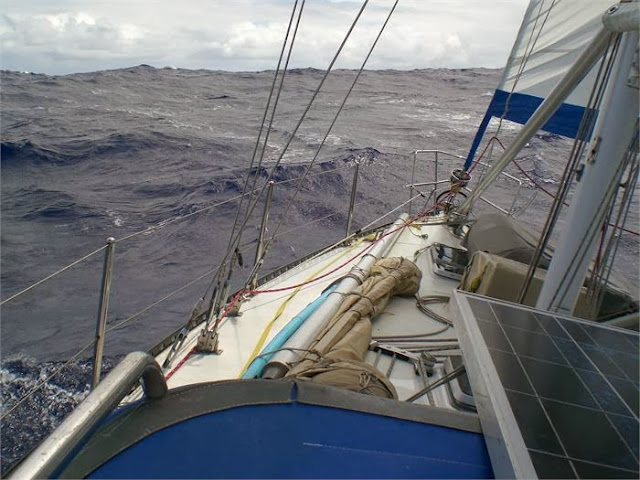Everybody makes foolish mistakes.
There's a saying that goes something like this: Geniuses figure things out fast; Wise individuals learn from other people's mistakes; Ordinary people learn from their own mistakes; Fools never learn anything.
There's a saying that goes something like this: Geniuses figure things out fast; Wise individuals learn from other people's mistakes; Ordinary people learn from their own mistakes; Fools never learn anything.
Considering that most boating accidents are caused by human error, I'd like to offer my contribution to making sailors less foolish, including me.
 |
| Boating accident in April 2013 at Figueira da Foz Portugal, as described in another post. |
I hope to gradually build a list of common boating accidents and my opinion on how to avoid them.
1. Run your jackline along the middle of the boat and have a short and a long tether on your harness
You have a dodger in the way. Then rig a jackline from the bow to the dodger and use some other means to clip on while getting past the dodger to the main line.
2. Wear a waterproof handheld VHF radio under your clothing held by a lanyard around your neck - especially useful for solo sailors
If you fall overboard or get locked in the head compartment (this actually happened to somebody before) you can call for help. I'm the only person I know that does this. It may sound like overkill, and maybe it is. All I know is that I've never had a car accident, but I still buckle up whenever I get into a car, and you probably do too.
3. Don't pee overboard
If you do it right, a direct deposit is not really that dangerous. But you know how it is, men aren't very smart below their waist and tend to do it wrong. You figure it out. On a windy day, drying your fingers on your pants afterward is also bad form.
1. Run your jackline along the middle of the boat and have a short and a long tether on your harness
 |
| Note the yellow jackline. Talk about false security. This boat is owned by salty world cruisers by the way. |
2. Wear a waterproof handheld VHF radio under your clothing held by a lanyard around your neck - especially useful for solo sailors
If you fall overboard or get locked in the head compartment (this actually happened to somebody before) you can call for help. I'm the only person I know that does this. It may sound like overkill, and maybe it is. All I know is that I've never had a car accident, but I still buckle up whenever I get into a car, and you probably do too.
3. Don't pee overboard
If you do it right, a direct deposit is not really that dangerous. But you know how it is, men aren't very smart below their waist and tend to do it wrong. You figure it out. On a windy day, drying your fingers on your pants afterward is also bad form.
3. Don't sail close to shore near windward capes. I know of one sailboat that sank at Cabo Raso, Portugal, because of this.
It would seem logical to think that if the wind is blowing hard from land there's no danger in sailing close to shore. Wrong.
It would seem logical to think that if the wind is blowing hard from land there's no danger in sailing close to shore. Wrong.
For example, on a summer afternoon, offshore winds at some of Portugal's capes and along the coast of Algarve can quickly transform a leisurely sail into a wild everything-on-the-floor storm-like struggle. If you have all sail up, you'll need to reef or drop sail, fast.
To reef or drop sail, you must turn into the wind and maintain a decent speed to keep your nose into the wind .
If you're 1 mile from shore and heading for it at 5 knots, struggling with the sails - while everybody aboard is shouting orders and opinions - you'll run aground in about 12 minutes. If you abort the operation your sails will pay the price.
Places where this is likely to happen on a summer afternoon, ranked by ferocity.
a) Cabo Raso to Cascais
b) From Sagres to Lagos
c) Cape Espichel on the way to Sesimbra
d) Lagos to Culatra (Faro)
Places where this is likely to happen on a summer afternoon, ranked by ferocity.
a) Cabo Raso to Cascais
b) From Sagres to Lagos
c) Cape Espichel on the way to Sesimbra
d) Lagos to Culatra (Faro)
 |
| Courtesy of the newspaper "Jornal das Caldas." This is incredible. The boat is now on the hard in Peniche and, I've been told, for sale. |
4. Tie off your anchor while sailing, untie it before you enter a port/bay.
Last year, the sailboat shown above was heading north for Peniche in rough conditions and was nearly sunk. The unsecured anchor came loose and banged a hole in the hull. By looking at the picture above, it's hard to believe that the lifeboat was able to tow it into port. The boat is still in Peniche on the hard and for sale, I believe.
5. Boom preventers are like seat belts - keep them on even close to home.
I nearly always rig preventers even if I'll be sailing close hauled. If the wind direction changes, if you change your route because of an obstacle, if you turn back for any reason - meaning you'll then be sailing downwind, etc. - will you set up the preventers on the go? I doubt it. Make sure the preventer line ends go back to a winch and not directly to a cleat.
I don't want to scare you, but jibing booms have killed more than a few sailors and seriously injured many more.
6. Repeat after me, "I will press the MOB (man overboard button) when anybody falls overboard."
Fortunately, nobody has fallen from Jakatar yet. However, I know how easy it is to lose something during an "exciting moment" because I simply forgot to press the MOB button. I lost my new Rocna anchor and chain in the bay of Sesimbra because of this oversight.
7. Don't ask inexperienced crew to do anything that may jeopardize their health or the boat
Bringing in or releasing the genoa sheet during a tack may seem harmless enough, but you'd be surprised how easily an inexperienced person can get their hands trapped between the winch and sheet line.
Once when anchoring at Berlenga Island, I slowly explained to three reasonably intelligent men how to drop the anchor. Right, easy, no problem. I turned the boat into the wind until it came to a near stop in 20 meters of water (deep anchorage) and shouted "drop it."
The chain clattered over the drum for and then stopped too early to reach the bottom. What's the problem?" I asked. No answer, just three men stooping over the bow roller excitedly doing something difficult that I couldn't see. When I walked forward, I found that they had cleated the chain to the starboard docking cleat with a knot. It took some time to undo the knot under the strain of the heavy anchor and chain. I know this is hard to believe, but it's true.
5. Boom preventers are like seat belts - keep them on even close to home.
I nearly always rig preventers even if I'll be sailing close hauled. If the wind direction changes, if you change your route because of an obstacle, if you turn back for any reason - meaning you'll then be sailing downwind, etc. - will you set up the preventers on the go? I doubt it. Make sure the preventer line ends go back to a winch and not directly to a cleat.
I don't want to scare you, but jibing booms have killed more than a few sailors and seriously injured many more.
6. Repeat after me, "I will press the MOB (man overboard button) when anybody falls overboard."
Fortunately, nobody has fallen from Jakatar yet. However, I know how easy it is to lose something during an "exciting moment" because I simply forgot to press the MOB button. I lost my new Rocna anchor and chain in the bay of Sesimbra because of this oversight.
7. Don't ask inexperienced crew to do anything that may jeopardize their health or the boat
Bringing in or releasing the genoa sheet during a tack may seem harmless enough, but you'd be surprised how easily an inexperienced person can get their hands trapped between the winch and sheet line.
Once when anchoring at Berlenga Island, I slowly explained to three reasonably intelligent men how to drop the anchor. Right, easy, no problem. I turned the boat into the wind until it came to a near stop in 20 meters of water (deep anchorage) and shouted "drop it."
The chain clattered over the drum for and then stopped too early to reach the bottom. What's the problem?" I asked. No answer, just three men stooping over the bow roller excitedly doing something difficult that I couldn't see. When I walked forward, I found that they had cleated the chain to the starboard docking cleat with a knot. It took some time to undo the knot under the strain of the heavy anchor and chain. I know this is hard to believe, but it's true.
To be continued, if I don't suffer a boating accident in the meanwhile.
No comments:
Post a Comment